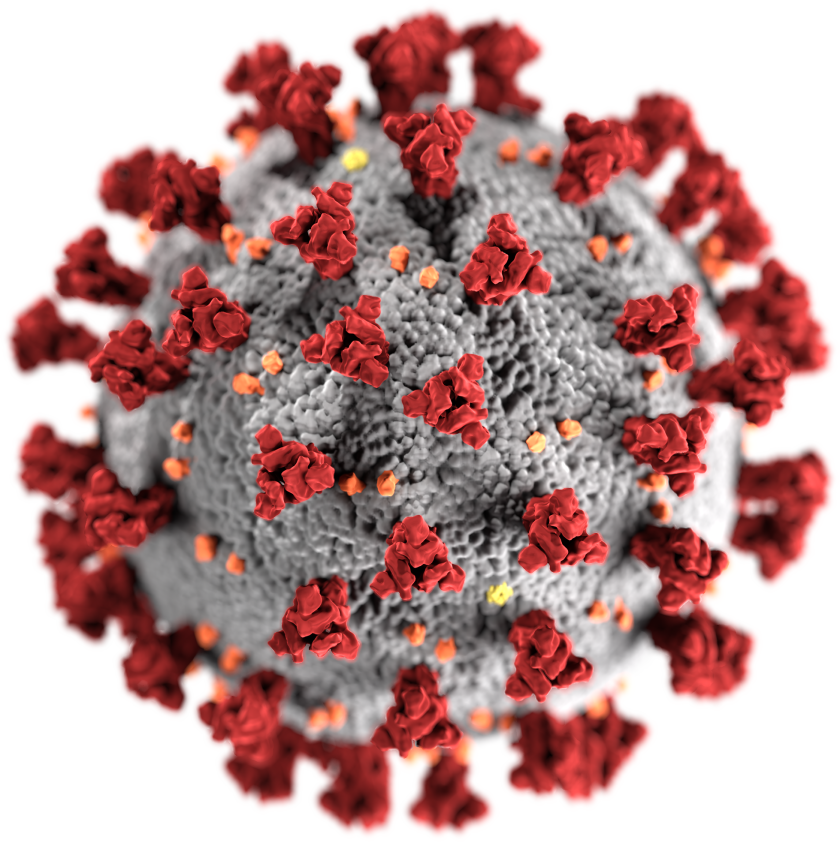04.05.2020 - #Corona: HZB resumes operation step by step

A novel coronavirus (SARS-CoV-2) is spreading worldwide and can cause severe respiratory symptoms (COVID-19). © CDC/Wikimedia commons
After a careful assessment of the situation, the management decided that operations at HZB would be resumed step by step from 4 May onwards. Strict security regulations apply. BESSY II will be available again for in-house research from 11 May. For Sars-CoV-2-relevant measurements a fast access to BESSY II has been established.
We will continuously update the information on this page. We follow the current recommendations of the Robert Koch Institute, the Federal Ministry of Health and the Senate Chancellery and ask all parties involved for their understanding.
Gradual resumption of operations at HZB
The HZB gradually resumes operations - under permanent observation of the situation and strict security regulations.
The BESSY II accelerator will be put back into operation, but will initially only be available to HZB researchers. In the next few weeks, the laboratories will again be able to operate in a restricted manner, in accordance with safety regulations. Please contact the laboratory managers for further details.
User operation at BESSY II will be suspended until 31 May 2020. Exception: Sars-CoV-2 relevant measurements on the MX-Beamlines can be performed. For research groups we have established a fast-track access.
The patient operation in the proton therapy takes place according to plan. Should changes become necessary due to developments, all those affected will be informed.
Furthermore these measures apply:
Immediate cancellation of all events and visitor groups until 20.07.2020 in accordance with the notification of the Senate Chancellery, e.g.:
- The Long Night of Science on 6 June 2020
- Physics for breakfast on 8 July 2020 is cancelled.
- Groups of visitors cannot visit our facilities.
- School lab groups are cancelled.
- Workshops and scientific events are cancelled.
- all trainings offered by HZB company sports are cancelled.
Access for external companies: In order to ensure effective containment of the corona virus, employees of external companies may only enter HZB if they have had no contact with an infected person within the last three weeks (neither privately nor professionally). This must be confirmed in a written form (see download box). Further information can be obtained from your respective contact person at HZB.
HZB staff will get fresh information via the intranet.
red.
https://www.helmholtz-berlin.de/pubbin/news_seite?nid=21180;sprache=en
- Copy link
-
What Zinc concentration in teeth reveals
Teeth are composites of mineral and protein, with a bulk of bony dentin that is highly porous. This structure is allows teeth to be both strong and sensitive. Besides calcium and phosphate, teeth contain trace elements such as zinc. Using complementary microscopy imaging techniques, a team from Charité Berlin, TU Berlin and HZB has quantified the distribution of natural zinc along and across teeth in 3 dimensions. The team found that, as porosity in dentine increases towards the pulp, zinc concentration increases 5~10 fold. These results help to understand the influence of widely-used zinc-containing biomaterials (e.g. filling) and could inspire improvements in dental medicine.
-
Fascinating archaeological find becomes a source of knowledge
The Bavarian State Office for the Preservation of Historical Monuments (BLfD) has sent a rare artefact from the Middle Bronze Age to Berlin for examination using cutting-edge, non-destructive methods. It is a 3,400-year-old bronze sword, unearthed during archaeological excavations in Nördlingen, Swabia, in 2023. Experts have been able to determine how the hilt and blade are connected, as well as how the rare and well-preserved decorations on the pommel were made. This has provided valuable insight into the craft techniques employed in southern Germany during the Bronze Age. The BLfD used 3D computed tomography and X-ray diffraction to analyse internal stresses at the Helmholtz-Zentrum Berlin (HZB), as well as X-ray fluorescence spectroscopy at a BESSY II beamline supervised by the Bundesanstalt für Materialforschung und -prüfung (BAM).
-
Element cobalt exhibits surprising properties
The element cobalt is considered a typical ferromagnet with no further secrets. However, an international team led by HZB researcher Dr. Jaime Sánchez-Barriga has now uncovered complex topological features in its electronic structure. Spin-resolved measurements of the band structure (spin-ARPES) at BESSY II revealed entangled energy bands that cross each other along extended paths in specific crystallographic directions, even at room temperature. As a result, cobalt can be considered as a highly tunable and unexpectedly rich topological platform, opening new perspectives for exploiting magnetic topological states in future information technologies.
